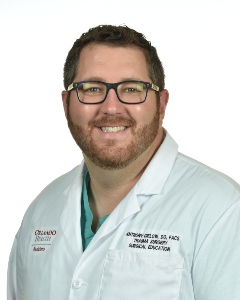If you have a hernia – a bulge or bump in your abdomen or groin – you’ll need surgery. Hernias don’t disappear naturally. The good news is that this common outpatient surgery, which repairs the weakened area, can have you returning to work in a week and back to your regular activities after four weeks or more.
Here’s what to know if you are having hernia surgery.
Before Surgery
Any hernia surgery starts with a surgeon evaluation. Most likely, they will request additional imaging, testing or visits to specialists.
- A CT scan shows precise details of your organs, fat and muscles, so surgeons know the location of the hernia. This determines whether the surgery can be completed robotically.
- If you’re diabetic, additional labs will be ordered to determine if your A1C levels are within healthy ranges.
- If you have cardiac issues, you will have to see a cardiologist to ensure you can safely undergo anesthesia.
You will be asked to halt drug use and medications before surgery. Your surgeon also will discuss if you need to temporarily quit smoking and using nicotine products. For most patients, it’s best to quit a month before surgery.
BMI and Weight Loss
Your surgeon will also want to know your body mass index. BMI measures your body fat based on height and weight. The higher your BMI, the greater the lateral tension caused by fat pushing against your abdominal wall. Too much pressure results in a hernia recurrence.
Because of this, you probably need to lose weight before hernia surgery. Your surgeon may recommend a weight-loss program or consultation with a bariatric center. It’s common for hernia surgeries to be considered in tandem with bariatrics to ensure a repair that lasts for the rest of your life. The exception is if the hernia is obstructed and the surgery is considered an emergency.
Surgery Day
The day before surgery, you will need to avoid eating or drinking anything after midnight.
Your surgery team will meet you in the pre-op area. You’ll see your anesthesiologist and surgeon. Your team confirms the location of the hernia, and a sterile, surgical skin marker is used to draw onto your skin. The mark might be an X or initials on the site location. Then you’ll be rolled into surgery.
After Surgery
After surgery, you’ll recover for an hour or so before you are released into the care of a friend or loved one to take you home. If nobody is available to help you once you’re home, you can be admitted overnight to the hospital.
You’ll be prescribed pain medications that will include some combination that can include a muscle relaxer, an NSAID and a narcotic.
For the first 48 hours, you’ll need to avoid showering as well as submerging your surgery site in water. If skin glue is used rather than sutures, staples or steri-strips, you’ll be able to shower sooner.
You’ll need to limit lifting to prevent strain on the surgical site, which could increase the likelihood of recurrence. In the first week to two weeks, you will likely have to avoid lifting more than 5 pounds. This means you’ll need help carrying grocery bags and completing small chores. In weeks three through six, you’ll need to avoid lifting more than 15 pounds. After six weeks, most patients can return to normal activities. Your doctor will give you specific instructions on what you can safely lift.
Follow-Up Appointments
Your surgeon will want to see you after two weeks to ensure the surgery site is healing normally. During this time, it’s normal to feel a bump under your sutures. This is simply inflammation. Bruising is also normal, especially if your surgery was completed robotically. The surgery site may also swell – so much so that you might think the hernia has returned. However, this is most likely just a seroma, a localized buildup of fluid. The space the hernia had occupied is now empty, and your body is absorbing that cavity. If the seroma is painful, you may need a drain, but otherwise, seromas tend to disappear naturally.
Surgery Success
Your surgeon will continue to encourage nicotine cessation as well as weight loss. Long-term overeating after surgery will increase the likelihood of tearing the muscle and the hernia returning.
Choose minimally invasive robotic surgery.
Orlando Health is proud to be a leader in robotic surgery, offering the benefits of this advanced minimally invasive technology to our patients.
Learn More





